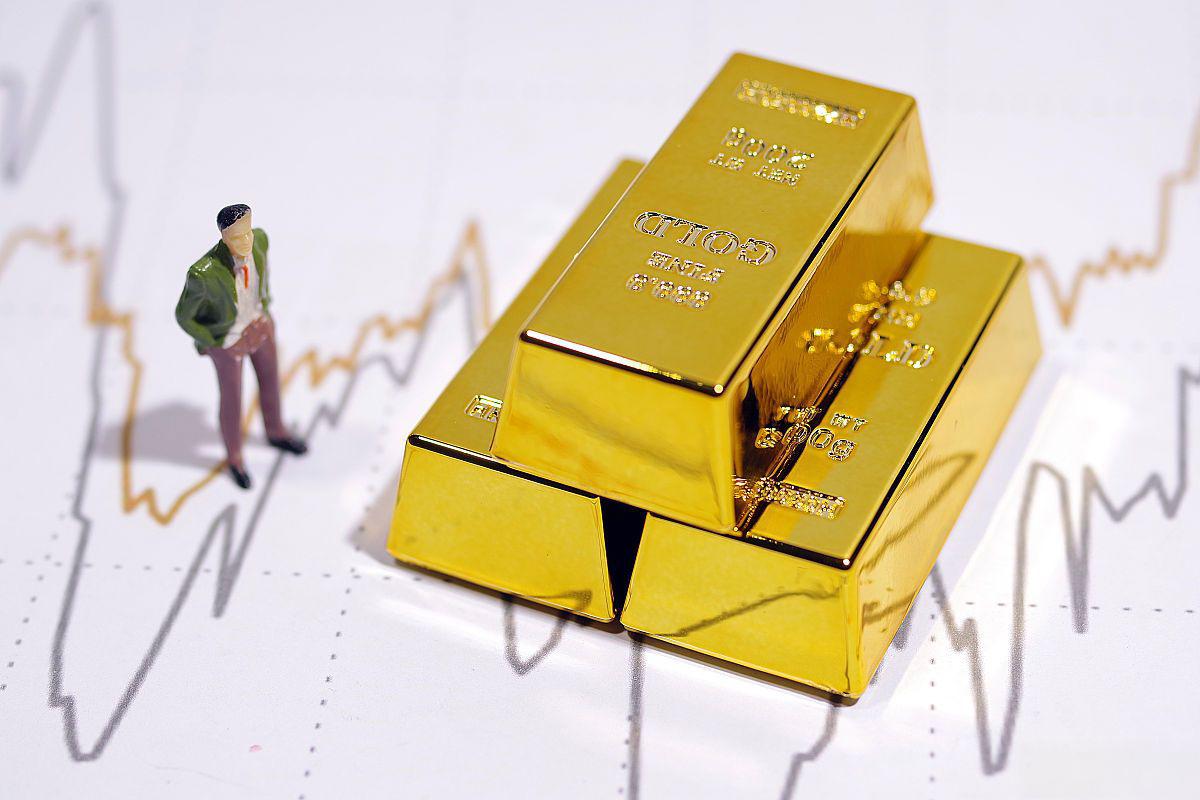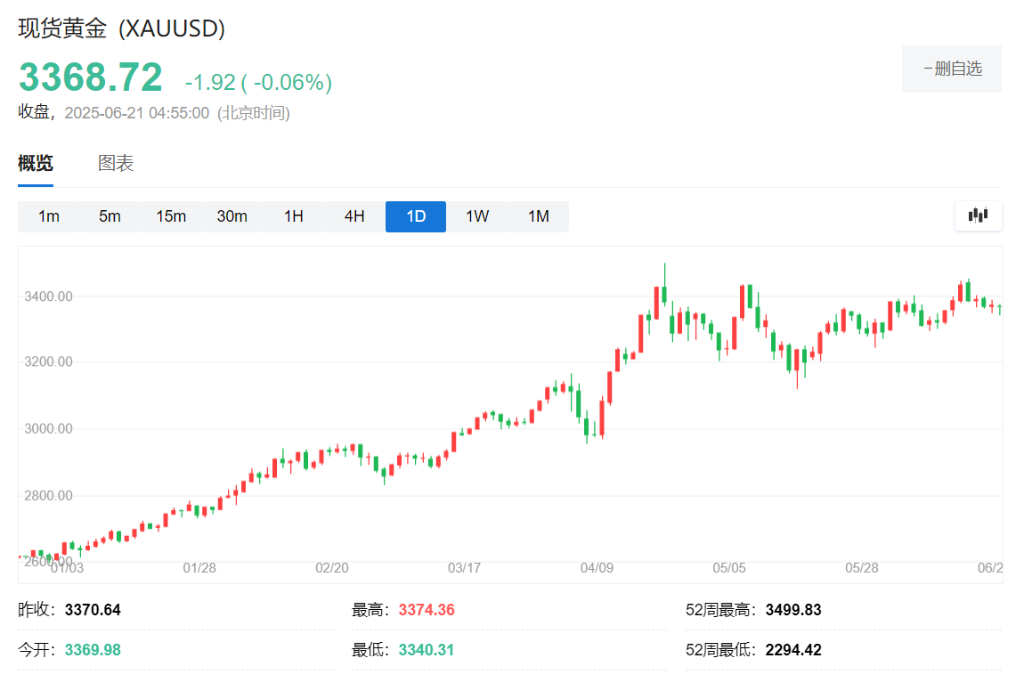
Recently, the Iran-Israel geopolitical conflict has continued to escalate, and the United States has frequently publicly released signals of military intervention, and the geopolitical risk premium of gold has subsided unusually quickly.
However, according to Deutsche Bank, historical data shows that gold's geopolitical risk premium usually peaks in the 8th-20th trading day after the crisis, with an average increase of 5.5%. Given the severity of the current conflict and the actual movement of US troops, the rapid fading of gold's geopolitical risk premium could be a false signal and should be prepared for gold's rebuilding risk premium in the coming weeks.
The geopolitical risk premium is fading quickly
Typically, when there is a major global geopolitical event, the price of gold as a safe-haven asset rises. But things have been a little different lately. According to the latest research report from Deutsche Bank, gold's geopolitical risk premium (i.e., the rise in prices due to tensions) has faded rapidly since last week, which is relatively rare in history.
As the Iran-Israel conflict continues to escalate, you might think that the price of gold will continue to soar. But in fact, the price of spot gold has been falling this week, and finally closed below $3,370, a cumulative decline of more than 1.8%, which is the first decline in three weeks. In the week of the conflict, the price of gold was close to $3,450 at one point.

不过,别急着下结论。德意志银行的研究显示,根据历史数据,黄金的价格在危机发生后的第8到第20个交易日往往会达到峰值,平均涨幅为:
现货价格:上涨约5.5%
模型残差:上涨约6.3%
In other words, while the price of gold has retreated for now, it does not mean that the risk premium has disappeared. Deutsche Bank believes that given the severity of the current Iran-Israel conflict and the actual movement of US troops, gold has the potential to re-establish its risk premium in the coming weeks.
The risk premium faded quickly
Deutsche Bank recently noted that gold's risk premium (i.e., the portion of the price increase due to geopolitical tensions) has faded rapidly in recent times, in contrast to the US president's increasingly public hints that the US military may be acting in concert with Israel.
U.S. President Donald Trump said on June 20 that he had set a "maximum" period of two weeks for Iran to avoid a U.S. military strike, according to a Wall Street article citing CCTV News and Xinhua News Agency. In other words, if Iran does not make concessions during this time, the United States may decide whether to carry out air strikes.
In addition, on June 19, the White House also said that Trump would decide whether to attack Iran within two weeks. There are reports that Trump believes it is necessary to cripple Iran's Fordo nuclear facility, but has not yet made a final decision.
Why is the price of gold falling instead of rising?
Despite the strong signals of military involvement from the U.S. government and the escalation of the Iran-Israel conflict, it is strange that the price of gold has not risen as expected, but has retreated. In this regard, several explanations are mentioned in the Deutsche Bank report:
Bargaining Chips: Some argue that the more openly a military threat signal, the more likely it is to gain more leverage in negotiations than to prepare for actual war.
Iran's Weakened Air Defenses: There is also an argument that the United States is in no hurry to act at this time, given that Iran's air defenses have been significantly weakened.
Gold's response to the "crisis": disappointing but historically based
Although gold's current performance in the Iran-Israel conflict has been somewhat disappointing, it is not surprising in historical context. The Deutsche Bank report provides us with some important references:
In the past 28 major crisis events (such as Hamas's attack on Israel, the Russia-Ukraine conflict, the WHO declaration of a pandemic, etc.), the spot price of gold has risen by an average of 3%. However, the increase varies widely between events.
Deutsche Bank has drawn several key observations from this historical data:
The time lag effect is significant: the price of gold does not spike immediately at the moment of the event, but usually accumulates gradually to a peak between the 8th and 20th trading days. This means that if you see that the price of gold is not rising right now, don't be disappointed, it may just not start to gain momentum yet.
The magnitude of the peaks varies widely: based on historical data, model residuals have increased by about 2.5% on average, and spot prices have increased by about 3% on average. But these numbers mask the fact that different events peak at different times, so the maximum average of a single reaction is likely to be higher – spot prices are up about 5.5% and model residuals up about 6.3%.
What is a "residual"?
In simple terms, the residuals are the difference between the actual observed and predicted values. It helps us understand the accuracy of the model and whether the market is behaving as expected.
The importance of the current conflict: how much should gold rise?
Deutsche Bank believes that the current Iran-Israel conflict is very important, even more so than some major events in history. If this is agreed, then gold's reaction should be at least a simple average, i.e. a 3% increase.
However, given the uniqueness and complexity of this conflict, gold's gains are likely to be even greater. In particular, if the U.S. military does step in, there is a chance that the price of gold will approach or exceed the all-time peak of 5.5%.
The next few weeks will need to be closely watched
Short-term volatility: Gold prices may fluctuate in the short term, but that doesn't mean the risk premium has disappeared.
Long-term opportunities: If the Iran-Israel conflict continues to escalate, or if the U.S. does take military action, demand for gold as a safe-haven asset could rise again.
Stay vigilant: Keep an eye on developments and changes in market sentiment, and be prepared for a possible rebuilding of the risk premium.
Despite the current pullback in gold prices, historically, gold tends to peak on the 8th to 20th trading day after a crisis. Given the importance and complexity of the Iran-Israel conflict, it is likely that gold will re-establish its risk premium in the coming weeks, and investors should stay on top of this and be prepared.





